Sept. 2, 2020
Newsletter MAFR - Law, Compliance, Regulation

Full reference: Frison-Roche, M.-A., For regulating or supervising, technical competence is required: example of the French creation of the "Pôle d'expertise de la régulation numérique", Newsletter MAFR - Law, Regulation, Compliance, 2nd of September 2020
Lire par abonnement gratuit d'autres news de la Newsletter MAFR - Law, Regulation, Compliance
Summary of the news
Through a decree of 31st of August 2020, the government created a national service, the "Pôle d'expertise de la régulation numérique" (digital regulation expertise pole). It has to furnish to State services a technical expertise in computer science, data science and algorithm processes in order to assist them in their role of control, investigation and study. The aim is to favor information sharing between researchers and State services in charge of regulating digital space.
As its acronym indicates, this pole of expertise aims to represents constance in a changing world. Moreover, more than being a national service, this organism must adopt a transversal dimension, its creation decree being signed by the Prime Minister, Minister of Economy, Minister of Culture and Minister of Digital Transition. The creation of such a pole shows the awareness of the government of the importance of technical competency in the regulation of digital space and of the necessity to centralize these expertises in one organ.
However, as the decree indicates, this pole of expertise could be consulted only by "State services", that excludes regulators which are independent from the State and which could put the pole in conflict of interest, and courts even if they are supposed to play a central role in the regulation of digital space and even if they are allowed to ask the advice of the regulator about some cases. But if regulators cannot size the pole, to whom does it benefit except the legislator and a few officials?
It would therefore have been better for this pole of expertise to be placed under the direction of regulatory and supervisory bodies, which would have enabled it to be able to be consulted both by regulators and by judges, both of whom are key players in digital regulation.
Aug. 31, 2020
Newsletter MAFR - Law, Compliance, Regulation

Full reference: Frison-Roche, M.-A., Compliance by Design, a new weapon? Opinion of Facebook about Apple new technical dispositions on Personal Data protection, Newsletter MAFR - Law, Compliance, Regulation, 31st of August 2020
Read by freely subscribing other news of the Newsletter MAFR - Law, Compliance, Regulation
Summary of the news:
Personal Data, as they are information, are Compliance Tools. They represent a precious resource for firms which must implement a vigilance plan in order to prevent corruption, money laundering or terrorism financing, for examples. It is the reason why personal data are the angular stone of "Compliance by design" systems. However, the use of these data cannot clear the firm of its simultaneous obligation to protect these same personal data, that is also a "monumental goal" of Compliance Law.
In order to be able to exploit these data in an objective of Compliance and protecting them in the same time, the digital firm Apple adopted for example new dispositions in order to the exploitation of the Identifier For Advertisers (IDFA) integrated in the iPad and in the iPhone and broadly used by targeted advertising firms, is conditioned to the consumer's consent.
Facebook reacted to this new disposition explaining that such measures will restrict the access to data for advertisers who will suffer from that. Facebook suspects Apple to block the access to advertisers in order to develop its own advertising tool. Facebook guaranteed to advertisers who work with it that it will not take similar measures and that it will always favor consultation before decision making in order to concile sometimes divergent interests.
We can sleep and already make some remarks:
- GDPR imposing to companies that they guarantee a minimal level of protection for personal data does not apply in the United-States. It is then possible that Apple acted through Corporate Social Responsibility (CSR), more than through legal obligation.
- The mode of regulation used here is the "conversational regulation" theorized by Julia Black. Indeed, regulators let the forces in presence discuss.
- This "conversational regulation" does not seem to be very efficient in this case and an intervention of administrative authorities or of judges could be justified via Competition Law, Regulation Law or Compliance Law, knowing that Competition Law will favor access right to information and Regulation or Compliance Law private life right.
The whole paradox of Compliance Law rests in the equilibrium between circulation of information and secret.
Aug. 27, 2020
Newsletter MAFR - Law, Compliance, Regulation

Full reference: Frison-Roche, M.-A., "Interregulation" between Payments System and Personal Data Protection: how to organize this "interplay"?, Newsletter MAFR - Law, Compliance, Regulation, 27th of August 2020
Read by freely subscribing the other news of the Newsletter MAFR - Law, Compliance, Regulation
Summary of the news
Regulation Law, in order to recognize and draw the consequences from the specificities of some objects, has been build, at the start, around the notion of "technical sector" although their delimitation is partially related to a political choice. But, in facts, there are multiple points of contacts between sectors, actors moving from one to another as objects. The regulatory solution is so to climb over some technical borders through the methodology of interregulation which is by the way the only one to enable the regulation of some phenomena going beyond the notion of sector and related to Compliance Law.
This news takes the exemple of companies furnishing new payment services. In order to they can provide these services, these firms needs to access to banking accounts of concerned people and so to very sensitive personal data. Regulation of such a configuration needs a cooperation between the banking regulator and the personal data regulator. Legislation being not sufficient to organize in Ex Ante this interregulation, the European Data Protection Board has published some guidelines on 17th of July 2020 about the way it conceives the articulation between the PSD2 (European directive about payment services) and GDPR and has announced that it intended to expand the circle of its interlocutors to do this interregulation. Such an initiative from EDPB can be justified by the uncertainty about how interpreting both texts and articulating them.
Aug. 21, 2020
Newsletter MAFR - Law, Compliance, Regulation

Full reference: Frison-Roche, M.-A., Being obliged by Law to unlock telephone is not equivalent to self-incrimination: Cour de cassation, Criminal Chamber, Dec. 19, 2019, Newsletter MAFR - Law, Compliance, Regulation, 21st of August 2020
Read by freely subscribing the other news of the Newsletter MAFR - Law, Compliance, Regulation
Summary of the news
The Cour de Cassation (French Supreme Judicial Court) made a decision on 19th of December 2019 about a case concerning a refusal to communicate his mobile phone's unlock code to the police while the police found him with a significant quantity of narcotic and a lot of cash and that there was a certain probability that this mobile phone get proofs of culpability of its owner. The individual was indicted not for narcotic trafficking but for not having communicate its unlock code which constitute an offense to article 434-15-2 of code pénal, from the loi du 3 juin 2018 renforçant la lutte contre la criminalité organisée, et le terrorisme et leur financement (law reinforcing organized crime, terrorisme and their financing).
The accused invokes before the court its right to not incriminate oneself. Indeed, the configuration face to policemen was such that if he refused to communicate its unlock code, he will be punished because of this obligation to communicate his code and that if he accepted, he will also be sanctioned because of the proofs contained into the mobile phone. Such a configuration therefore offered him no alternative to confessing, which is contrary to the European Convention on Human Rights and to European and national jurisprudence.
Face to such a case, the Cour de Cassation chose to segment the information and proposed the following solution: if the researched information cannot be obtained regardless of the suspect willingness, it is not possible to constraint this person to communicate this information without violating its procedural rights, but if the information can be obtained regardless of the suspect willingness then the individual is obliged to communicate his code. In the current case, as it was possible for policemen to obtain information contained in the phone by technical means, longer but existent, then the refuse of communication of the unlock code by the suspect constitute an obstruction that should be sanctioned.
Such a decision is an exemple of the conciliation by the judge of two fundamental but contradictory "monumental goals" of Compliance Law: transparency of information towards public authorities and very sensible personal data protection.
To go further, read Marie-Anne Frison-Roche's working paper: Rethinking the world from the notion of data
Jan. 16, 2020
Thesaurus : Doctrine
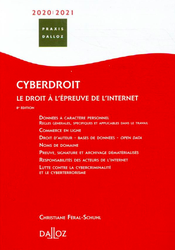
Full reference: Féral-Schuhl, C., Cyberdroit. Le Droit à l'épreuve de l'internet, Collection Praxis Dalloz, Dalloz, 8th edition, 2020, 1731p.
Read the forth of cover (in French)
Read the table of contents (in French)
Nov. 16, 2019
Publications

The Finance Bill has proposed to the Parliament to vote an article 57 whose title is: Possibilité pour les administrations fiscales et douanières de collecter et exploiter les données rendues publiques sur les sites internet des réseaux sociaux et des opérateurs de plateformes (translation: Possibility for the tax and customs administrations to collect and exploit the data made public on the websites of social networks and platform operators).
Its content is as is in the text voted on in the National Assembly as follows:
"(1) I. - On an experimental basis and for a period of three years, for the purposes of investigating the offenses mentioned in b and c of 1 of article 1728, in articles 1729, 1791, 1791 ter, in 3 °, 8 ° and 10 ° of article 1810 of the general tax code, as well as articles 411, 412, 414, 414-2 and 415 of the customs code, the tax administration and the customs administration and indirect rights may, each as far as it is concerned, collect and exploit by means of computerized and automated processing using no facial recognition system, freely accessible content published on the internet by the users of the online platform operators mentioned in 2 ° of I of article L. 111-7 of the consumer code.
(2) The processing operations mentioned in the first paragraph are carried out by agents specially authorized for this purpose by the tax and customs authorities.
(3) When they are likely to contribute to the detection of the offenses mentioned in the first paragraph, the data collected are kept for a maximum period of one year from their collection and are destroyed at the end of this period. However, when used within the framework of criminal, tax or customs proceedings, this data may be kept until the end of the proceedings.
(4) The other data are destroyed within a maximum period of thirty days from their collection.
(5) The right of access to the information collected is exercised with the assignment service of the agents authorized to carry out the processing mentioned in the second paragraph under the conditions provided for by article 42 of law n ° 78-17 of January 6, 1978 relating to data processing, the files and freedoms.
(6) The right to object, provided for in article 38 of the same law, does not apply to the processing operations mentioned in the second paragraph.
(7) The terms of application of this I are set by decree of the Council of State.
(8) II. - The experiment provided for in I is the subject of an evaluation, the results of which are forwarded to Parliament as well as to the National Commission for Data Protection at the latest six months before its end. "
This initiative provoked many comments, rather reserved, even after the explanations given by the Minister of Budget to the National Assembly.
What to think of it legally?
Because the situation is quite simple, that is why it is difficult: on the one hand, the State will collect personal information without the authorization of the persons concerned, which is contrary to the very object of the law of 1978 , which results in full disapproval; on the other hand, the administration obtains the information to prosecute tax and customs offenses, which materializes the general interest itself.
So what about it?
Read below.

Updated: July 4, 2019 (Initial publication: April 30, 2019)
Publications

► Complete reference : Frison-Roche, M.-A., Having a good behavior in the digital space, working paper, April 2019.
____
Summary: The jurist sees the world through the way he learns to speak
The Law of the Environment has already come to blur this distinction, so finally so strange because this classical conception refers to a person taken firstly in his immobility (Law of individuals), and then in his only actions (Contrats and Tort Law, Property Law). Indeed, the very notion of "environment" implies that the person is not isolated, that he/she is "surrounded", that he/she is what he/she is and will become because of what surrounds him/her ; in return the world is permanently affected by his/her personal action. On second thought, when once "Law of Individuals" was not distinguished from Family Law, the human being was more fully restored by this division in the legal system that not only followed him/her from birth to death but also in him/her most valuable interactions: parents, siblings, couples, children. Thus Family Law was finer and more faithful to what is the life of a human being.
To have instituted Law of Individuals, it is thus to have promoted of the human being a vision certainly more concrete, because it is above all of their identity and their body about what Law speaks, astonishing that we have not noticed before that women are not men like the others. To have instituted the Law of the people, it is thus to have promoted of the human being a vision certainly more concrete, because it is above all of his identity and his body that one speaks to us, astonishing that the we have not noticed before that women are not men like the others
From this concrete vision, we have all the benefits but Law, much more than in the eighteenth century, perceives the human being as an isolated subject, whose corporeality ceases to be veiled by Law
This freedom will come into conflict with the need for order, expressed by society, social contract, state, law, which imposes limits on freedom of one to preserve freedom of the other, as recalled by the French Déclaration des Droits de l'Homme of 1789. Thus, it is not possible de jure to transform every desire in action,, even though the means would be within reach of the person in question, because certain behaviors are prohibited in that they would cause too much disorder and if they are nevertheless committed, they are punished for order to return. Thus, what could be called "law of behavior", obligations to do and not to be put in criminal, civil and administrative Law, national and international Law, substantial Law and procedural Law :they will protect the human being in movment pushed by the principle of freedom forward others and thing, movement inherent in their status as a Person.
The human being is therefore limited in what they want to do. In the first place by the fact: their exhausting forces, their death that will come, the time counted, the money that is lacking, the knowledge that they does not even know not holding, all that is to say by their very humanity; Secondly, by the Law which forbids so many actions ...: not to kill, not to steal, not to take the spouse of others, not to pass as true what is false, etc. For the human being on the move, full of life and projects, Law has always had a "rabat-joy" side. It is for that reason often ridiculous and criticized because of all its restraining regulations, even hated or feared in that it would prevent to live according to our desire, which is always my "good pleasure", good since it is mine. Isolated and all-powerful, the human being alone not wanting to consider other than its desire alone.
Psychoanalysis, however, has shown that Law, in that it sets limits, assigns to the human being a place and a way of being held with respect to things and other persons. If one no longer stands themselves by the prohibition of the satisfaction of all desire (the first of which is the death of the other), social life is no longer possible
But this presentation aims to make it possible to admit that the criterion of Law would be in the effectiveness of a sanction by the public power: the fine, the prison, the confiscation of a good, which the rudeness does not trigger whereas Law would imply it: by this way we are thus persuaded of the intimacy between the public power (the State) and Law... But later, after this first lesson learned, the doubt comes from the consubstansuality between Law and State. Is it not rather appropriate to consider that Law is what must lead everyone to "behave well" with regard to things and people around them? The question of punishment is important, but it is second, it is not the very definition of Law. The French author Carbonnier pointed out that the gendarme's "kepi" is the "Law sign", that is to say what it is recognized without hesitation, but it is not its definition.
The first issue dealt with by Law is then not so much the freedom of the person as the presence of others. How to use one's freedom and the associated deployment of forces in the presence of others? How could I not using it when I would like to harm them, or if the nuisance created for them by the use of my free strength is indifferent to me
We do not use our force against others because we have interest or desire, we do not give him the support of our strength while he indifferent us, because Law holds us. If the superego was not enough. If Law and the "parental function of the States" did not make alliance. We do it because we hold ourselves
Or rather we were holding ourselves.
Because today a new world has appeared: the digital world that allows everyone not to "hold" himself, that is to say to constantly abuse others, never to take them into consideration, to attack massively. It's a new experience. It is not a pathological phenomenon, as is delinquency (which simply leads to punishment), nor a structural failure in a principle otherwise admitted (which leads to regulatory remedies) but rather a new use, which would be a new rule: in the digital space, one can do anything to everyone, one is not held by anything or anyone, one can "let go" (I). This lack of "good behavior" is incompatible with the idea of Law, in that Law is made for human beings and protect those who can not afford to protect themselves; that is why this general situation must be remedied (II).
Cornu, G., Linguistique juridique, 2005.
Frison-Roche, M.-A. & Sève, R., Le Droit au féminin (ed.), 2003.
Under this "mask" of the "subject of Law", we are all equal. S. Archives de Philosophie du Droit, Le sujet de droit, 1989.
Baud, J.P., L'affaire de la main volée. Histoire juridique du corps humain, 1993.
On neurosis as a constitutive mode of child sociability, s. Lebovici, S., "C'est pas juste", in La justice. L'obligation impossible, 1994.
Read the article of Alain Supiot about the idée of Rule common of all, under the discussion between all, presented by this author through the artwork of Kafka : "Kafka, artiste de la loi", 2019; Kafka is very present in the work of Alain Supiot, for example in his First Lesson in the Collège de France, 2012, or in an Introduction of La Gouvernance par les nombres ; This latter book is now available in English : Governance by numbers. The making a legal model of allegiance, 2017 (translated by S. Brown).
That's why splitting Persons Law and Family Law masks another reality: the family is not made up of third parties. The links are there. They pre-exist. Starting from the only Persons Law pushes to think one can "build" his/her family by links drawn on white paper: the contracting of the families made up of individuals becomes thinkable, even natural.
April 17, 2019
Teachings : Sectoral Regulatory Law 2019-2020

Même si l'expression de "régulation du numérique" est extrêmement courante, elle ne va pas du tout de soi, si l'on respecte le sens précis des mots. L'idée même de réguler cet espace contredit son origine, des principes américains - comme la liberté d'expression, ou des soucis économiques - comme l'innovation, qui renvoie plutôt vers l'Ex Post que vers l'Ex Ante auquel est toujours associé le Droit de la Régulation. En outre, le numérique peut être difficilement qualifié de "secteur", ce qui paraît mener à une impasse.
C'est pourquoi pour l'instant en premier lieu l'on s'appuie sur l'efficacité relative mais non inexistante de l'Ex Post, du droit pénal et du droit civil mais surtout l'on fait mener en première ligne le Droit de la concurrence, à la fois dans son utilisation Ex Post de mesures comportementales (obligation d'accès notamment) et dans sa partie Ex Ante qu'est le contrôle des concentrations. En outre les Régulateurs sectoriels ne sont pas arrêtés par l'immatérialité du numérique et utilisent leur pouvoir de sanction, notamment quant à l'usage des données.
Car c'est autout de la notion de "donnée" qu'une "gouvernance" pourrait prendre forme en matière numérique. Il pourrait s'agit d'internaliser dans des opérateurs numériques, en tant qu'ils tiennent mondialement le secteur, des obligations pour autrui, en trouvant un juste milieu entre une "Régulation à la californienne" basée sur des consentements mécaniques et une "Régulation à la chinoise" dans laquelle l'Etat tient tout.
Pour cela, de la même façon que le Droit de la Régulation reconcrétise le monde que le marché concurrentiel ayant pour seul critère ultime le prix, une gouvernance par la Compliance pourrait reconcrétiser le monde digitalisé par le numérique en distinguant dans une catégorie abusivement unifiée de "data" plusieurs sortes de data. L'Europe en a donné l'exemple à travers la Régulation internalisée par le Droit de la Compliance dans les entreprises lorsque les data "concerne" les personnes.
L'on peut analyser la décision rendue par la CNIL, Google le 21 janvier 2019.
Consulter les slides servant de support à la leçon.
Revenir à la présentation générale du Cours.
Consulter la bibliographie générale du Droit commun de la Régulation
Consulter le Dictionnaire bilingue du Droit de la Régulation et de la Compliance
Oct. 26, 2018
Thesaurus : Doctrine

Référence complète : Rabagny-Lagoa, A., La conformité dans le règlement UE n° 2016/679, du 27 avril 2016, relatif à la protection des personnes physiques à l'égard du traitement des données à caractère personnel et à la libre circulation de ces données, in Petites Affiches, octobre 2018, n°215, pp. 8-14.
Les étudiants de Sciences po peuvent lire l'article via le Drive dans le dossier "MAFR - Régulation & Compliance".

Updated: Sept. 8, 2018 (Initial publication: April 30, 2018)
Publications

► This working document was intended to serve as a support for a conference pronounced in French in the conference Droit et Ethique ( Law & Ethics) of May 31, 2018 in a symposium organized by the Court of Cassation and the Association Française de Philosophie du Droit. French Association of Philosophy of Law on the general theme Law & Ethics.
See a general presentation of this conference.
Rather, it has served as a support for the article to be published in the Archives de Philosophie du Droit (APD). This article is written in French.
► Summary: It is through the Law that the human being has acquired a unity in the West (I). What religion could have done, the Law also did by posing on each human being the indetachable notion of him of "person" (I.A). But this is what is challenged today, not the personality and the power that the human being has to express his freedom but the unity that implies in the disposition that we have of ourselves in repelling the desire that others have always had to dispose of us. Current law tends to "pulverize" human beings into data and transform into neutral legal services what was considered before as the devouring of others. The legal concept of "consent", ceasing to be proof of a free will but becoming an autonomous concept, would suffice (I.B.).
To prevent the reigning of the "law of desires", which merely reflects the adjustment of forces, we must demand here and now the ethical sovereignty of Law, because Law can not be just just be just the interests adjustment (II). We can form this request if we do not want to live in an a-moral universe (II.A), if we see that the unity of the person is the legal invention that protects the weak human being (II.B.). If we admit this imperative, then we must finally ask who in the legal system will express and impose it, especially the legislator or the judge, because we seem to have lost the ability to recall this principle of the Person on which the West was so centered. But the principles that are no longer said disappear. There would then remain only the case-by-case adjustment of interests between human beings in the world field of particular forces. At this yardstick, Law would be more than a technique of securisation of particular adjustments. Law would be reduced at that and would have lost its link with Ethics. (II.C).
July 11, 2018
Thesaurus : Doctrine

Complete reference : Randell, Ch., How can we ensure that big Data does not make us prisoners of technology ?, Reuters Newsmaker event, London, 2018.
July 3, 2018
Thesaurus : Doctrine

Référence complète : Canac, J.-M., et Teller, M., De la rule of law à la rule by code : la blockchain, un projet faustien ?, in Études en l'honneur de Philippe Neau-Leduc, Le juriste dans la cité, coll. « Les mélanges », LGDJ- Lextenso, 2018, pp.181-188.
Lire une présentation générale dans lequel l'article est publié.
June 4, 2018
Thesaurus : Doctrine

Référence complète : Chaltiel, F., La protection des données personnelles. À propos de l'entrée en vigueur du règlement général de protection des données, in Petites Affiches, Lextenso, juin 2018, pp. 6-22.
Le 25 mai 2018 doit marquer le début d'un nouvel âge des droits numériques de chacun. Le règlement général de protection des données, dont la préparation remonte à plusieurs années, doit en effet entrer en vigueur en mai 2018.
Il tire les conséquences de plusieurs décennies de progrès du numérique et vise à assurer, dans un cadre technique inédit à l'échelle de l'histoire de la communication, une protection renforcée des données.
Les obligations sont nombreuses, il n'est pas certain que les acteurs concernés soient en mesure de garantir l'ensemble de ces droits dans le délai imparti. Le nouveau droit fondamental de la protection des données personnelles est sans doute un des défis juridiques majeurs des années à venir pour nos sociétés.
May 22, 2018
Thesaurus : Doctrine
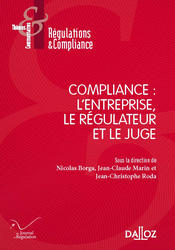
Référence complète : Zolynski, C., Compliance et droit des données personnelles in Borga, N., Marin, J.-Cl. et Roda, J.-Cl. (dir.), Compliance : l'entreprise, le régulateur et le juge, Série Régulations & Compliance, Dalloz, 2018, pp. 129-136.
Lire une présentation générale de l'ouvrage dans lequel est publié l'article.
Consulter les autres titres de la Série dans laquelle est publié l'ouvrage.
May 15, 2018
Thesaurus : Doctrine

Référence complète : Moreaux, A., Comment se conformer au RGPD ?, in Affiches Parisiennes, mai 2018, pp. 1-3.
L'échéance du fameux Règlement général sur la protection des données approche. Pour Mounir Mahjoubi, secrétaire d'État au Numérique, « 2018 est l'année du RGPD » qui va entraîner un « véritable choc de sécurité » sur la toile. La mise en conformité avec le nouveau règlement européen sur le digital qui entre en vigueur le 25 mai est une question centrale pour les entreprises.
May 14, 2018
Thesaurus : Soft Law

Référence générale : CNIL, RGPD et TPE/PME : un nouveau modèle de registre plus simple et plus didactique
April 12, 2018
Thesaurus : Doctrine
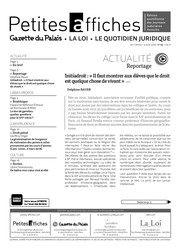
Référence complète : Espace de réflexion éthique de Normandie (EREN), Le don de gamètes : quelles questions pour le XXIe siècle ?, in Petites affiches, Lextenso, avril 2018, pp. 5-9.
Parmi les sujets débattus dans le cadre des États généraux de la bioéthique, l’assistance médicale à la procréation et le don de gamètes soulèvent de nombreuses questions. Un débat organisé à Caen, par l’Espace de réflexion éthique de Normandie, a permis de discuter des enjeux associés à une éventuelle levée de l’anonymat du don et à la possibilité d’accéder à certaines données informatives sur les donneurs de gamètes.
Les étudiants de Sciences-Po peuvent lire l'article via le Drive, dossier "MAFR- Regulation & Compliance"
Nov. 24, 2017
Thesaurus : Doctrine

Référence complète : Derieux, E., Données à caractère personnel et communication publique . Règlement (UE) 2016/79 du 27 avril 2016 relatif à la protection des personnes physiques à l'égard du traitement des données à caractère personnel et à la libre circulation de ces données in Études en l'honneur du Professeur Jérôme Huet. Liber amicorum, LGDJ - Lextenso, 2017, pp. 127-138.
Consulter une présentation générale de l'ouvrage.
Les étudiants de Sciences po peuvent lire l'article via le Drive dans le dossier "MAFR - Régulation & Compliance".

Updated: Oct. 25, 2017 (Initial publication: May 27, 2016)
Publications

► Full Reference: Frison-Roche, M.-A., Globalization from the point of view of Law, working paper, May 2017.
____
🎤 This working paper initially served as a basis for a synthesis report made in French in the colloquium organized by the Association Henri Capitant in the International German Days on the subject of "Le Droit et la Mondialisation" (Law and Globalization).
📝 Il sert dans un second temps de base à l'article paru dans l'ouvrage La Mondialisation.
📝 it serves as a second basis for the article (written in English, with a Spanish Summary) to be published in the Brezilian journal Rarb - Revista de Arbitragem e Mediação (Revue d`Arbitrage et Médiation).
It uses the Bilingual Dictionary of the Law of Regulation and Compliance.
____
► Summary of the Working: Globalization is a confusing phenomenon for the jurist. The first thing to do is to take its measure. Once it has been taken, it is essential that we allow ourselves to think of something about it, even if we have to think about it. For example, on whether the phenomenon is new or not, which allows a second assessment of what is taking place. If, in so far as the law can and must "pretend" to defend every being, a universal claim destined to face the global field of forces, the following question - but secondary - is formulated: quid facere? Nothing ? Next to nothing ? Or regulate? Or can we still claim that the Law fulfills its primary duty, which is to protect the weak, including the forces of globalization?
____
read the Working Paper below⤵️
Oct. 4, 2017
Thesaurus : Doctrine
Référence complète : Falque-Pierrotin, I., L'Europe des données ou l'individu au coeur d'un système de compliance, in Frison-Roche, M.-A. (dir.), Régulation, Supervision, Compliance, Série Régulations, Dalloz, 2017.
Lire la présentation générale de l'ouvrage dans lequel l'article est publié.
Consulter les autres ouvrages de la Série dans laquelle l'ouvrage dans l'article a été inséré est publié.
Les étudiants de Sciences-Po peuvent consulter l'article via le Drive, dossier "MAFR-Régulation"
March 24, 2017
Conferences
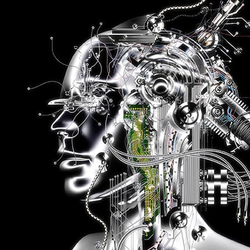
Référence complète : Frison-Roche, M.-A., Le droit des data, in Association Française de Philosophie du Droit et Cité des Sciences et de la Techniques, Vers de nouvelles humanités ? L’humanisme face aux nouvelles technologies, 24 mars 2017, auditorium de la Cité des sciences et de l’industrie.
Regarder la vidéo de la conférence.
Consulter le document du programme complet du colloque (23 et 24 mars 2017).
Consulter en lien le programme.
Retrouver les activités passées et présentes de l'Association française de philosophie du Droit.
Les travaux du colloque seront publiés dans le tome 59 des Archives de Philosophie du Droit (APD). Voir la présentation de quelques volumes des Archives de Philosophie du Droit.
Le "Droit des data" semble se constituer en branche du droit nouvelle, sans doute parce que des textes les visent, en leur ensemble et parce qu'ils ont pour sous-jacent spécifique l'informatique et l'espace qu'elle a fait naître, le numérique. Mais doit-on même admettre ce redécoupage du système juridique et de l'enseignement dynamique qu'on en fait ?
Pourquoi y associer si souvent l'adjectif big , à la fois si attractif et effrayant, nouveau Big Fish qui nous ramène à l'enfance ?
Ne sommes-nous pas pulvérisés dans un premier temps et reconstruits par d'autres, qui disposent ainsi de nous comme on le fait de marionnettes à tel point qu'on en vient à parler de "quasi-propriété" parce que la propriété des êtres humains à laquelle les entreprises songent pourtant serait un mot trop violent mais trop exact ?
A quoi ressemble le "Droit des data" car, puisqu'il est nouveau, soit il faut trouver ses racines, soit il faut trouver des comparaisons pour références, afin qu'il ressemble à autre chose qu'un bric-à-brac de textes qui définissent par exemple la "banque de données" comme un "ensemble de données" ou de casuistiques qui colmatent les cas, l'éthique étant confiée par désespoir à la notion si étrangement venue de "design" ?
La ressemblance la plus nette et qui permettrait de mieux le comprendre est sans doute de l'anticiper, c'est le Droit financier.
Or, les données sont le plus souvent la projection de l'être humain lui-même.
Et à propos de celui, Législateur et Juge n'auraient rien à dire ?
Que vaut la parole humaine face à ce flot de chiffres qui mime si parfaitement la langue humaine et si servilement que les ingénieurs donnent aux robots l'allure de jeunes filles souriantes et toujours consentantes ?
Contre la servilité consentante, modèle du marché global, c'est la Parole de la Personne humaine que le Droit des data doit préserver.
La Parole humaine, elle se formule en Questions. Et non pas de demandes. Elle se forge en Savoir. Et non pas en information.
Cette Parole humaine, que les data, série de chiffres ne peuvent imiter, ce sont les artistes qui la portent.
C'est donc à eux qu'il faut donner la parole.
Et la servir. D'en faire que la glose. Dans deux exercices de style. En s'inclinant tout d'abord devant un artiste pythique qui a décrit en 1972 notre engloutissement sous l'information et les images immobiles. Puis en s'inclinant devant l'artiste qui est le dernier homme que le premier appelle, l'homme qui par son art exprime la bravoure humaniste.
Le courage, c'est tout ce dont nous avons besoin.
Mais en avons-nous ?
Voir les slides préparés pour servir de support à la conférence.
Regarder la vidéo de l'intervention, laquelle, pour des raisons techniques, ne correspondit pas aux slides.
.
Nov. 19, 2016
Interviews

Référence complète : Frison-Roche, M.-A., Pour réguler l'espace numérique : la solution de "l'interrégulation" !, entretien, Revue Communication Commerce Électronique, nov. 2016, p.8.
Cet interview a été donné à l'occasion de l'ouvrage Internet, espace d'interrégulation
Il aborde trois questions :
- la définition de l'interrégulation,
- les justifications de l'interrégulation en matière numérique
- les conditions de l'effectivité de l'interrégulation en matière numérique
Sept. 1, 2016
Thesaurus : Doctrine
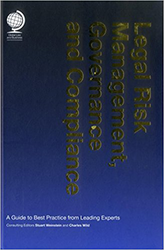
Référence complète : Weinstein, S., Legal Risk Management, Governance and Compliance: A Guide to Best Practice from Leading Experts, Globe Business Publishing, 2016.
Présentation du livre en anglais :
In today's globalised business environment, companies face a complex assortment of new and often contradictory laws and regulations.
High-profile corporate scandals involving compliance failures teach us that loss of reputation can have a significant, if not fatal, effect on a company.
International companies recognise this and invest heavily in systems designed to detect and prevent compliance breaches.
However, such systems and controls cannot succeed without the development of a strong compliance culture that secures buy-in from executives, managers, employees, contractors and business partners all at levels.
This title offers cutting edge know-how and guidance for the development and management of a sophisticated legal risk management and compliance operation.
While identifying risks and regulatory challenges, chapters also explore how professionals can manage processes;
- implement change; track issues and loss events;
- screen potential clients, partners, employees and contractors;
- implement appropriate remediatio
The book features chapters on :
- board structures,
- tax compliance,
- fraud and bribery,
- Sarbanes-Oxley requirements,
- European capital markets regulation,
- competition law,
- data protection,
- offshoring and the cloud,
- human resources issues for managers,
- managing legal risk in China.
July 7, 2016
Interviews

Référence complète : Frison-Roche, M.A., Les droits des personnes, Internet et la CNIL, Dalloz - Etudiants, 7 juillet 2016.
Les questions posées ont trait à :
- la décision de la CNIL, Numericable, quant à la nature de l'obligation des opérateur numériques de transmettre des informations aux autorités ;
- la nature de cette obligation ;
- la portée du "droit à l'oubli", tel qu'il ressort de l'arrêt Google Spain de la CJUE ;
- les enseignements de la querelle entamée par Google sur l'espace d'effectivité du déréférencent impliqué par ce droit à l'oubli.
April 22, 2016
Publications
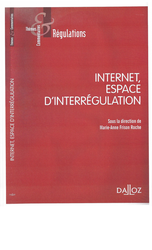
Référence complète : Frison-Roche, M.-A., Les conséquences régulatoires d'un monde repensé à partir de la notion de "donnée", in Frison-Roche, M.-A. (dir.), Internet, espace d'interrégulation, série "Régulation", Journal of Regulation - Dalloz, 2016, p.183-207.
Il est à corréler à un article publié dans le même ouvrage : Penser le monde à partir de la notion de "donnée".
Cet article s'appuie sur un working paper : lire le working paper.